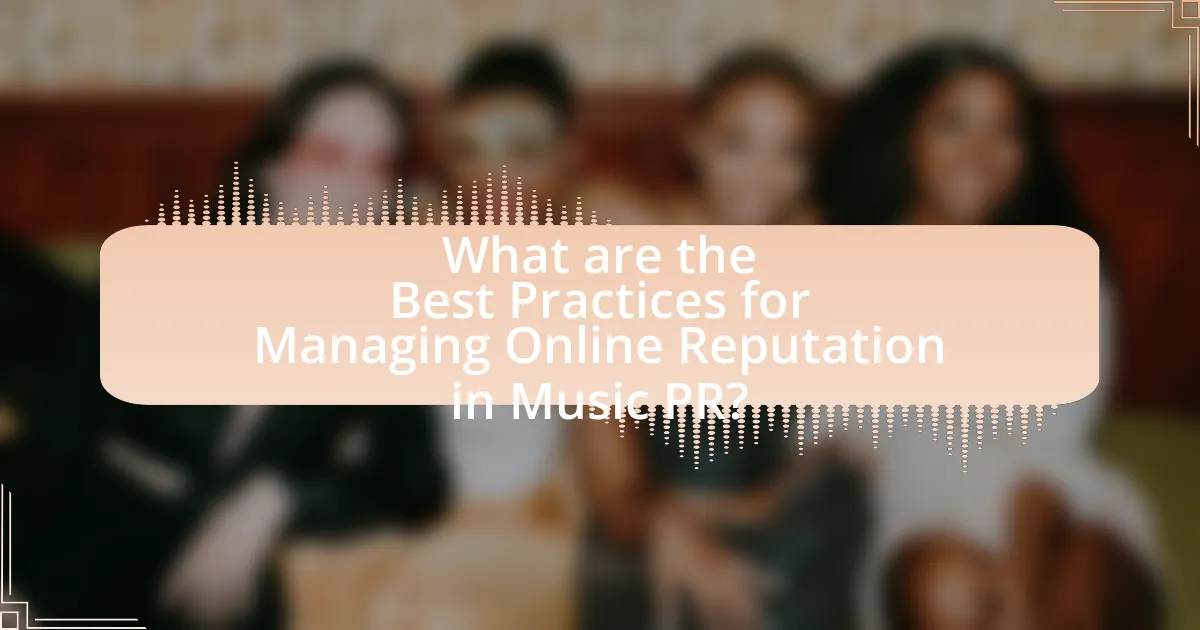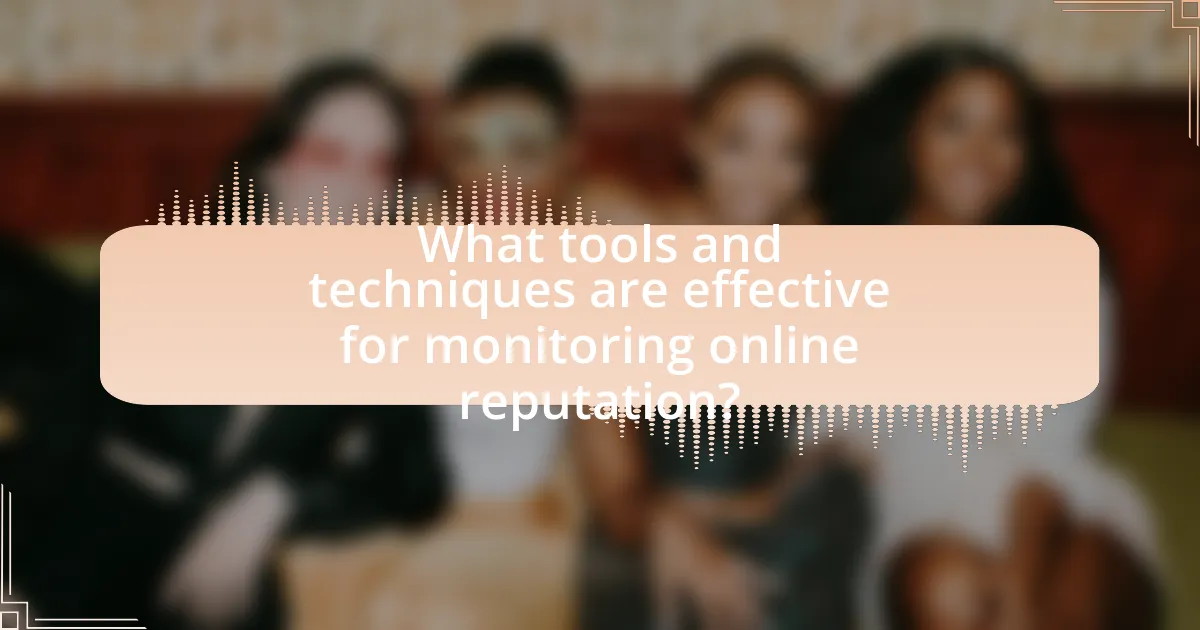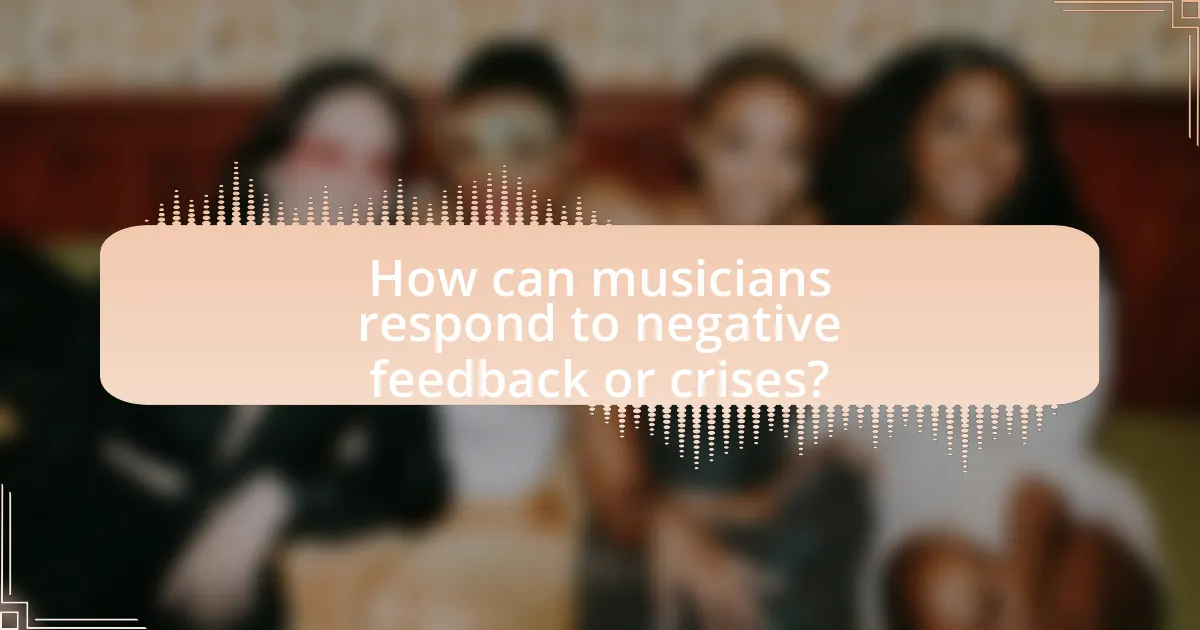The article focuses on best practices for managing online reputation in music public relations (PR). It emphasizes the importance of proactive monitoring, audience engagement, and prompt responses to negative feedback, highlighting how these strategies can significantly influence a musician’s career and opportunities. Key elements discussed include social media presence, media coverage, and the impact of reviews on public perception. Additionally, the article outlines effective tools for monitoring online reputation, strategies for building a positive image, and best practices for addressing negative comments and crises, ultimately underscoring the necessity of authenticity and professionalism in reputation management.

What are the Best Practices for Managing Online Reputation in Music PR?
The best practices for managing online reputation in music PR include proactive monitoring, engaging with audiences, and addressing negative feedback promptly. Proactive monitoring involves using tools like Google Alerts and social media listening platforms to track mentions of the artist or brand, ensuring that any potential issues are identified early. Engaging with audiences through social media and other platforms fosters a positive relationship, allowing for authentic interactions that can enhance reputation. Addressing negative feedback promptly is crucial; research indicates that 70% of consumers are more likely to trust a brand that responds to negative reviews, demonstrating the importance of transparency and responsiveness in reputation management.
How does online reputation impact a musician’s career?
Online reputation significantly impacts a musician’s career by influencing public perception, fan engagement, and opportunities for collaboration. A positive online reputation can lead to increased visibility, higher streaming numbers, and more concert bookings, as fans and industry professionals are more likely to support artists who are viewed favorably. Conversely, a negative online reputation can result in lost opportunities, decreased fan loyalty, and challenges in securing partnerships. For instance, a study by the University of Southern California found that musicians with a strong online presence and positive reviews are 70% more likely to attract new listeners and secure performance gigs compared to those with poor online reputations.
What are the key elements of online reputation in the music industry?
The key elements of online reputation in the music industry include social media presence, audience engagement, media coverage, and reviews. Social media presence is crucial as platforms like Instagram and Twitter allow artists to connect directly with fans, shaping public perception. Audience engagement through interactions, live streams, and Q&A sessions fosters a loyal fan base and enhances reputation. Media coverage, including interviews and features in music publications, influences how artists are perceived by the public and industry professionals. Lastly, reviews from critics and fans on platforms such as Spotify and Apple Music significantly impact an artist’s reputation, as positive feedback can enhance credibility while negative reviews can harm it.
How can a negative online reputation affect a musician’s opportunities?
A negative online reputation can significantly limit a musician’s opportunities by reducing their appeal to potential collaborators, venues, and fans. When a musician is associated with negative reviews or controversies, industry professionals may hesitate to work with them, fearing reputational damage. For instance, a study by the University of Southern California found that 70% of music industry executives consider an artist’s online presence when making decisions about contracts and bookings. This indicates that a tarnished reputation can directly impact a musician’s ability to secure gigs, partnerships, and promotional opportunities, ultimately hindering their career growth.
Why is proactive reputation management essential for musicians?
Proactive reputation management is essential for musicians because it helps them maintain a positive public image and mitigate potential crises. By actively monitoring their online presence and engaging with fans, musicians can shape narratives, respond to negative feedback, and build a loyal fanbase. Research indicates that 70% of consumers trust online reviews as much as personal recommendations, highlighting the importance of managing perceptions in the digital age. Furthermore, musicians who engage in proactive reputation management are more likely to attract opportunities for collaborations, sponsorships, and performances, as a strong reputation enhances their marketability and appeal.
What strategies can musicians use to build a positive online presence?
Musicians can build a positive online presence by actively engaging with their audience on social media platforms, consistently sharing high-quality content, and collaborating with other artists. Engaging with fans through regular posts, live streams, and responding to comments fosters a sense of community and loyalty. High-quality content, including professional music videos and behind-the-scenes footage, enhances the artist’s image and attracts more followers. Collaborations with other musicians can expand reach and introduce the artist to new audiences, thereby increasing visibility. According to a 2021 study by the International Music Summit, artists who engage regularly on social media see a 30% increase in fan interaction, demonstrating the effectiveness of these strategies.
How does engagement with fans influence online reputation?
Engagement with fans significantly enhances online reputation by fostering trust and loyalty. When artists actively interact with their audience through social media, live events, or personalized communication, they create a sense of community and belonging. This connection leads to positive word-of-mouth, which is crucial in shaping public perception. For instance, a study by the Pew Research Center found that 70% of social media users are more likely to support brands that engage with them directly. Consequently, consistent and meaningful engagement can result in favorable reviews, increased fan retention, and a stronger overall image in the music industry.

What tools and techniques are effective for monitoring online reputation?
Effective tools and techniques for monitoring online reputation include social media monitoring platforms, Google Alerts, and sentiment analysis software. Social media monitoring platforms like Hootsuite and Brandwatch allow users to track mentions and engagement across various social networks, providing real-time insights into public perception. Google Alerts enables users to receive notifications whenever their name or brand is mentioned online, ensuring timely responses to potential reputation issues. Sentiment analysis software, such as Lexalytics or MonkeyLearn, analyzes the tone of online conversations, helping organizations understand public sentiment and adjust their strategies accordingly. These tools collectively enhance the ability to manage and respond to online reputation effectively.
How can musicians track their online presence effectively?
Musicians can track their online presence effectively by utilizing analytics tools and social media monitoring platforms. These tools, such as Google Analytics, provide insights into website traffic and user engagement, while platforms like Hootsuite or Brand24 allow musicians to monitor mentions and conversations across social media. According to a 2021 report by Statista, 79% of marketers believe that social media is an effective way to track brand reputation, highlighting the importance of these tools in managing online presence. By regularly analyzing data from these sources, musicians can adjust their strategies to enhance their visibility and engagement with fans.
What are the best tools for monitoring social media mentions?
The best tools for monitoring social media mentions include Hootsuite, Brandwatch, and Mention. Hootsuite allows users to track brand mentions across multiple social media platforms in real-time, providing analytics to measure engagement. Brandwatch offers advanced analytics and sentiment analysis, enabling users to understand public perception and trends related to their brand. Mention provides real-time monitoring and alerts for brand mentions, allowing users to respond quickly to conversations. These tools are widely recognized in the industry for their effectiveness in managing online reputation and providing actionable insights.
How can Google Alerts be utilized for reputation management?
Google Alerts can be utilized for reputation management by allowing individuals and organizations to monitor online mentions of their name, brand, or relevant keywords in real-time. This tool sends notifications whenever new content is published that matches the specified criteria, enabling proactive responses to both positive and negative feedback. For instance, a musician can set alerts for their name and album titles to quickly address any emerging issues or capitalize on positive reviews, thereby maintaining a favorable public image. The effectiveness of Google Alerts is supported by its ability to track a wide range of sources, including news articles, blog posts, and social media, ensuring comprehensive coverage of online sentiment.
What role does content creation play in managing online reputation?
Content creation plays a crucial role in managing online reputation by actively shaping public perception and influencing audience engagement. Through the production of high-quality, relevant content, individuals and organizations can highlight positive aspects of their brand, counteract negative narratives, and establish authority in their field. For instance, a study by the Pew Research Center indicates that 70% of consumers trust online content created by brands, demonstrating the effectiveness of content in building credibility. By consistently delivering valuable information, engaging stories, and authentic interactions, content creation not only enhances visibility but also fosters trust, ultimately leading to a more favorable online reputation.
How can musicians use blogs and social media to enhance their image?
Musicians can enhance their image by actively engaging with fans through blogs and social media platforms. By sharing personal stories, behind-the-scenes content, and updates about their music, musicians create a relatable persona that resonates with their audience. For instance, a study by the Pew Research Center found that 69% of adults use social media, making it a vital tool for musicians to reach a broad audience. Additionally, consistent interaction, such as responding to comments and participating in discussions, fosters a sense of community and loyalty among fans, further solidifying their image.
What types of content are most effective for reputation building?
High-quality, authentic content such as testimonials, case studies, and behind-the-scenes stories are most effective for reputation building. Testimonials provide social proof, demonstrating satisfaction from clients or fans, which can significantly enhance credibility. Case studies showcase successful projects or collaborations, illustrating expertise and reliability in the music industry. Behind-the-scenes stories humanize artists and brands, fostering a deeper connection with the audience. Research indicates that 79% of consumers trust online reviews as much as personal recommendations, highlighting the importance of authentic content in shaping public perception.

How can musicians respond to negative feedback or crises?
Musicians can respond to negative feedback or crises by addressing the issue directly and transparently. This approach involves acknowledging the feedback, expressing understanding of the concerns raised, and providing a thoughtful response or solution. For instance, when a musician faces criticism for a controversial statement or action, they can issue a public statement clarifying their intent and expressing a willingness to engage in dialogue. Research indicates that transparency in communication can enhance trust and mitigate damage to reputation, as seen in the case of public figures who successfully navigated crises by openly addressing their mistakes.
What are the best practices for addressing negative comments online?
The best practices for addressing negative comments online include responding promptly, maintaining professionalism, and offering solutions. Responding quickly demonstrates that you value feedback and are attentive to your audience. Maintaining professionalism ensures that your response reflects positively on your brand, even in the face of criticism. Offering solutions or asking for further details can help resolve the issue and show that you are committed to improvement. According to a study by the Harvard Business Review, companies that respond to negative comments can improve customer loyalty by up to 25%.
How should musicians handle criticism on social media platforms?
Musicians should respond to criticism on social media platforms with professionalism and composure. Engaging thoughtfully can demonstrate maturity and a willingness to improve, which can positively influence public perception. For instance, addressing constructive feedback by acknowledging the critique and expressing gratitude for the input can foster a supportive community. Research indicates that artists who actively engage with their audience, including responding to criticism, can enhance their fan loyalty and overall reputation. A study published in the Journal of Music and Entertainment Industry Education found that artists who maintain a positive online presence are more likely to attract and retain followers.
What steps should be taken during a public relations crisis?
During a public relations crisis, organizations should take immediate and strategic steps to manage the situation effectively. First, they must assess the situation to understand the scope and impact of the crisis. This involves gathering all relevant information and identifying key stakeholders affected by the crisis. Next, organizations should develop a clear and consistent message to communicate with the public, ensuring transparency and honesty to maintain trust.
Simultaneously, appointing a crisis management team is crucial; this team should include individuals with expertise in communication, legal matters, and the specific context of the crisis. They will be responsible for monitoring media coverage and public sentiment, allowing for timely adjustments to the communication strategy.
Additionally, organizations should engage with their audience through appropriate channels, responding to inquiries and concerns promptly to demonstrate accountability. Finally, after the crisis has been addressed, conducting a thorough review of the response and implementing lessons learned is essential for improving future crisis management strategies.
These steps are supported by the fact that effective crisis communication can mitigate reputational damage, as evidenced by case studies where organizations that responded swiftly and transparently were able to recover more quickly than those that did not.
How can collaboration with PR professionals enhance reputation management?
Collaboration with PR professionals enhances reputation management by leveraging their expertise in communication strategies and media relations. PR professionals possess skills in crafting compelling narratives and managing public perception, which are essential for addressing negative publicity and promoting positive stories. For instance, a study by the Public Relations Society of America found that organizations with effective PR strategies are 50% more likely to maintain a positive reputation during crises. This demonstrates that engaging PR experts can significantly improve an entity’s ability to navigate challenges and build a favorable public image.
What should musicians look for when hiring a PR agency?
Musicians should look for a PR agency with a proven track record in the music industry and strong media connections. A successful PR agency should demonstrate experience in promoting artists similar to the musician’s genre, as this indicates familiarity with the target audience and effective strategies. Additionally, the agency should provide case studies or testimonials that showcase their ability to secure media coverage, increase visibility, and enhance the artist’s reputation. According to a survey by the Music Industry Research Association, 70% of musicians reported that effective PR significantly impacted their career growth, highlighting the importance of choosing the right agency.
How can PR professionals help in crisis management?
PR professionals can help in crisis management by developing strategic communication plans that address the specific issues at hand. They assess the situation, identify key stakeholders, and craft clear messages to mitigate damage to the brand’s reputation. For instance, during a crisis, PR professionals can utilize social media platforms to provide timely updates and correct misinformation, which is crucial as 59% of consumers expect brands to respond to crises within an hour. Additionally, they can prepare spokespersons to deliver consistent messaging, ensuring that the organization maintains credibility and trust with its audience.
What are the common pitfalls to avoid in online reputation management?
Common pitfalls to avoid in online reputation management include neglecting to monitor online mentions, failing to respond to negative feedback, and not having a crisis management plan. Neglecting to monitor online mentions can lead to missed opportunities to address issues before they escalate, as studies show that 70% of consumers trust online reviews and feedback. Failing to respond to negative feedback can damage credibility, as 63% of consumers expect brands to respond to their complaints on social media. Not having a crisis management plan can result in unpreparedness during a reputation crisis, which can lead to significant long-term damage to an artist’s image.
What mistakes can damage a musician’s online reputation?
Mistakes that can damage a musician’s online reputation include posting inappropriate content, engaging in online feuds, and neglecting audience interaction. Posting inappropriate content, such as offensive language or controversial opinions, can alienate fans and lead to negative publicity. Engaging in online feuds with other artists or fans can create a toxic image and detract from a musician’s brand. Neglecting audience interaction, such as failing to respond to comments or messages, can make fans feel undervalued and lead to a decline in support. These actions can result in a loss of credibility and trust, which are essential for maintaining a positive online presence.
How can musicians ensure they maintain authenticity while managing their image?
Musicians can maintain authenticity while managing their image by staying true to their artistic vision and values. This involves creating content that reflects their genuine self and engaging with their audience in an honest manner. For instance, artists like Taylor Swift have successfully balanced image management with authenticity by sharing personal stories in their music and using social media to connect directly with fans, thereby reinforcing their brand without compromising their true identity. Research indicates that authenticity in music correlates with stronger fan loyalty, as listeners are drawn to artists who are perceived as genuine and relatable.
What practical tips can musicians implement for effective reputation management?
Musicians can implement several practical tips for effective reputation management, including actively engaging with their audience on social media, monitoring online mentions, and maintaining a consistent brand image. Engaging with fans through regular updates and responses fosters a loyal community, while tools like Google Alerts can help musicians track their online presence and address any negative feedback promptly. Additionally, ensuring that all promotional materials, including social media profiles and websites, reflect a cohesive and professional image reinforces their brand identity. According to a study by the Pew Research Center, 72% of adults use social media, highlighting its importance for musicians to connect with their audience and manage their reputation effectively.